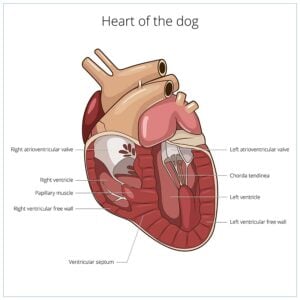Dogs are subject to many heart complications and conditions, and heart murmurs are just one of them. All dogs may suffer from this condition, but sometimes it is hard to detect and identify.
Heart murmurs in dogs may display themselves physically in different ways. The condition isn't always dangerous but can be if it's not monitored and treated correctly. Heart murmurs are classified depending on their characteristics as well as their possible effects on the dog.
What are Heart Murmurs in Dogs?
 A heart murmur occurs when additional heart vibrations are being produced by a disturbance of the blood flow. Sometimes the disturbance is enough to create an audible noise that can be heard by pressing your ear to your dog’s chest.
A heart murmur occurs when additional heart vibrations are being produced by a disturbance of the blood flow. Sometimes the disturbance is enough to create an audible noise that can be heard by pressing your ear to your dog’s chest.
To make it easier for both the owners and vets, heart murmurs in dogs are commonly classified by a mixture of characteristics. One of the main characteristics it relies upon is timing.
For example, systolic murmurs are created when the dog's heart muscle contracts, while a diastolic murmur happens when the heart muscle relaxes between its beats. The continuous and to-and-fro murmurs can happen at any point in the dog's cardiac cycle or during its entirety rather than a singular event.
Heart murmurs in dogs are not necessarily common but are not unheard of. They can occur in dogs of any breed type, age, or gender. Murmurs do not seem to have a preference of which type having the longer-lasting effects on any specific dog.
Symptoms of Heart Murmurs
The symptoms that are associated with heart murmurs in dogs depend on an assortment of characteristics which include their grade, location, and configuration.
The only type that is exclusively associated with a specific symptom is a murmur that is a byproduct of structural heart disease in dogs. The animal may show signs of congestive heart failure, which may include physical weakness, coughing, and exercise intolerance.
Grading Scale
As previously mentioned, to assist in identifying the severity of the murmur, a grading scale was created. Each grade is associated with a distinctive characteristic, how easily the heart murmur can be detected through audio. This ranges from being able to be heard without assistance to requiring a stethoscope.
These grades are listed as:
- Grade I – Barely audible
- Grade II – Soft, can be heard by using a stethoscope
- Grade III – Moderate loudness (murmurs that are related to blood circulation are generally categorized into at least grade III)
- Grade IV – A loud murmur that radiates throughout the chest, often heard from one side to the other
- Grade V – A very loud murmur, heard with a stethoscope lightly touching their chest; its vibration is strong enough to be felt on the dog’s chest
- Grade VI – A very loud murmur (louder than a Grade V) that can also be heard by a stethoscope lightly touching the dog’s chest
Configuration
The configuration of the heart murmur in dog is the pattern of which the heart murmur can be heard. It describes the way the sound changes and adapts while affecting the dog.
They are labeled within three configurations:
- Plateau – These murmurs maintain the same loudness and are typically associated with blood regurgitation through a hole or dent in the hearts valves (aka regurgitant murmurs)
- Crescendo-Decrescendo – These are murmurs that get louder and then become softer. They are typically related to ejection murmurs because of their unstable forward sequence.
- Decrescendo – These heart murmurs begin loud and then become softer over some time. They are most commonly noticed with diastolic murmurs.
RELATED: 4 Heart Problems in Dogs – Causes, Symptoms and Treatments
Causes of Dog Heart Murmurs
There are many reasons that heart murmurs in dogs may develop. Some are naturally occurring, while others are related to the development of certain conditions or diseases in your pet.
The most common problems that lead to heart murmurs are disturbances in the blood flow. A generic blood flow disturbance consists of high flow through normal or abnormal heart valves or with other structures that vibrate throughout the blood flow.
“Large-breed dogs, such as golden retrievers, Rottweilers, and Newfoundlands, are more prone to subaortic stenosis, whereas small-breed dogs and bulldogs are more prone to pulmonic stenosis,” says Jordan Vitt, DVM (source).
Another disturbance is one that is associated with obstruction of the outflow or the forward flow that happens in a dog's diseased heart valves or leading into a dilated excellent blood vessel.
Last but not least, disturbances that can cause blood flow problems can be associated with the regurgitant flow. This issue is caused by a malfunctioning heart valve, also known as a patent ductus arteriosus, or a defect in the wall that separates the heart's left and right sides.
Certain types of heart murmurs in dogs can be caused by more specific conditions and diseases. These affect the animal's heart in a way that leads to murmur’s development, and if left untreated, can worsen the condition.
Systolic Heart Murmurs
Systolic heart murmurs in dogs are the most common type of murmur diagnosed in canine population. This is when the murmurs take place as the heart muscle contracts.
These types of heart murmurs can be caused by a huge number of conditions:
- Hyperthyroidism
- Mitral valve heart failure
- Tricuspid valve heart failure
- Anemia
- Cardiomyopathy
- Aortic valve insufficiency
- Heartworm disease
- Aortic stenosis
- Atrial septal defect
- Ventricular septal defect
- Dynamic subaortic stenosis
- Tetralogy of Fallot
- Mitral valve dysplasia
- Tricuspid valve dysplasia
- Dynamic right ventricular outflow obstruction
- Pulmonic stenosis
- Systolic anterior mitral motion
- Mitral valve endocarditis
- Tricuspid valve endocarditis
As it is the most common type, it has the most causes. Although the purpose of the murmur is not limited to those on the list, they can provide a good idea of when to look out for a heart murmur in a dog.
Diastolic Heart Murmurs
A diastolic heart murmurs in dogs occur in between beats of the heart when the muscles are relaxed. They occur at the opposite time of a systolic heart murmur.
These are commonly associated with:
- Mitral valve stenosis
- Tricuspid valve stenosis
- Aortic valve endocarditis
- Pulmonic valve endocarditis
This is an unlikely type of heart murmur that is not found often in canine population. Diastolic heart murmurs are ones that are unique and can sometimes be misinterpreted.
Continuous or To-and-Fro Heart Murmurs
Unlike systolic or diastolic heart murmurs in dogs that choose a certain time in the heart's rhythm, continuous murmurs do not have a specified time. These murmurs can happen at any point and sometimes at both points of the heartbeat.
They are commonly associated with:
- Patent ductus arteriosus
- Aortic stenosis
- Ventricular septal defect
Most of the diseases and conditions that are linked to continuous heart murmurs in dogs are in addition to aortic regurgitation.
Diagnosing a Dog with Heart Murmurs
To correctly identify precisely what is producing the symptoms that the dog is experiencing, a vet must distinguish the type of sound the heart is making. This is critical to rule out any other abnormal heart sounds such as split sounds, gallop rhythms, clicks, or ejection sounds.
They must also locate exactly where the sound is originating from. Sometimes, owners can misidentify the sound and presume it to be coming from the heart when it can actually be from the lungs. The vet will need to listen closely to determine which one is the true cause of the problem. They will also determine whether the sound is related to the timing of the heartbeat or if it is related to the timing of the dog’s breathing.
A cardiac ultrasound, also known as an echocardiogram, is the definitive test to determine the cause of your dog’s heart murmur and diagnose any underlying heart disease,” says Sonya Wesselowski, DVM (source).
Depending on the location and the radiation of the murmur throughout the chest as well as the timing of the murmur in the cardiac cycle, the vet can identify the underlying cause. They can also confirm and further specify this cause through the use of multiple tests.
To start in the right direction, the vet may ask about any symptoms that the dog may have been experiencing in the past couple of months. The symptoms are not always directly related to the murmur, but rather the underlying cause.
Some issues are buried so far underneath others that the vet will struggle to identify what is actually happening in the body of the dog. The vet is attempting to locate any possible issues that the dog may be facing that the owner may not know about or be familiar with.
How to Treat a Heart Murmur in Dogs
The treatment of a heart murmur in a dog is determined by the severity of the condition and how badly it is affecting your pet. Dogs respond to conditions in different ways, therefore, the plan of action varies based upon the individual animal.
 If the heart murmur is leading towards heart failure, then the dog will need to be treated as an inpatient. Otherwise, the dog will be treated and considered an outpatient. Each course of treatment will be determined by the symptoms and the Grade assigned to the murmur and then administered as planned.
If the heart murmur is leading towards heart failure, then the dog will need to be treated as an inpatient. Otherwise, the dog will be treated and considered an outpatient. Each course of treatment will be determined by the symptoms and the Grade assigned to the murmur and then administered as planned.
As an example, puppies that are experiencing low-grade murmurs may require little or possibly no treatment as the murmur could resolve and treat itself within a matter of months. On the other hand, older dogs with moderate murmurs may need to have frequent overnight care to treat the murmur until it is within a functional grade. For both, routine diagnostic imaging is used to monitor the development of the murmur.
READ NEXT: 8 Ways to Lower the Risk of Heart Disease in Dogs














